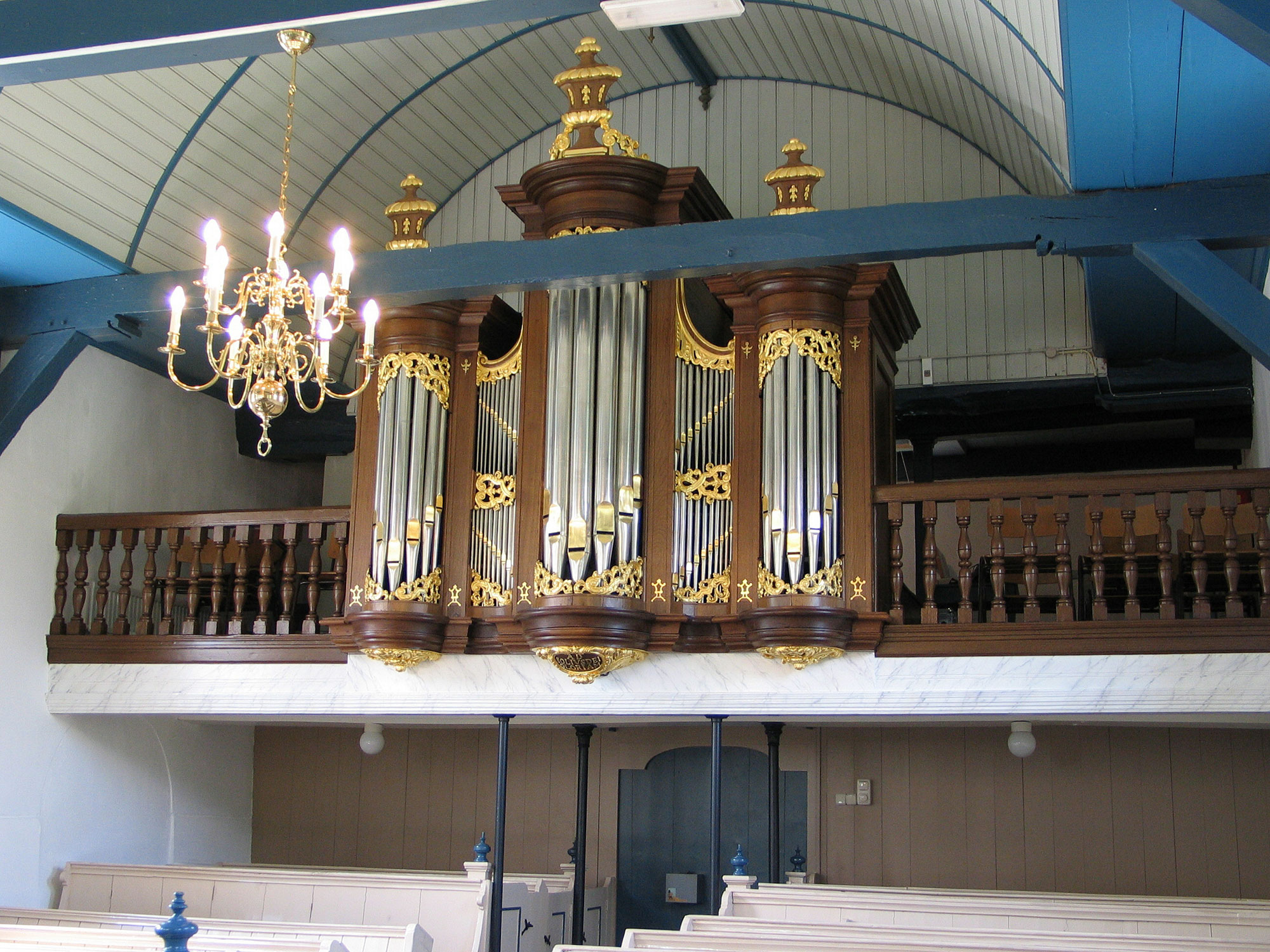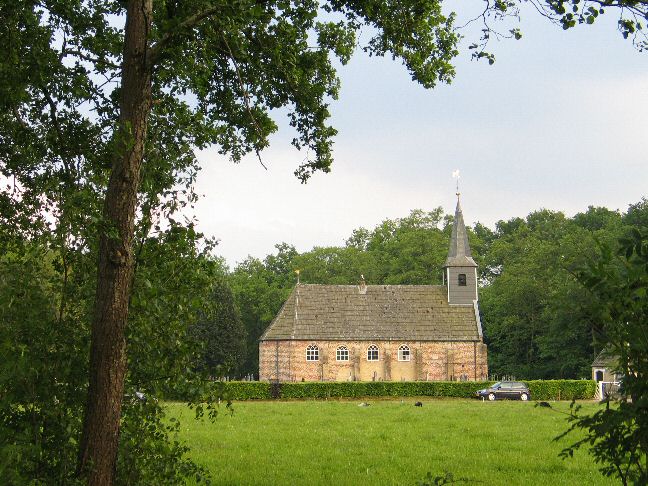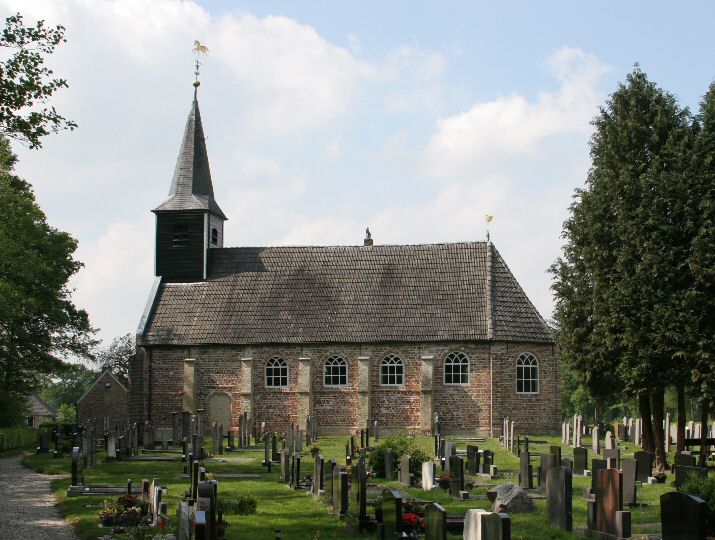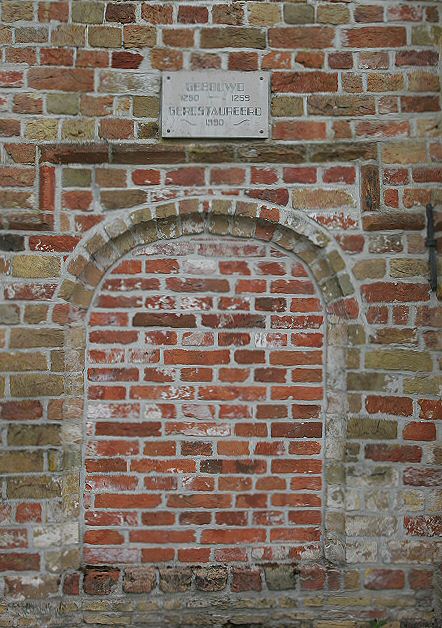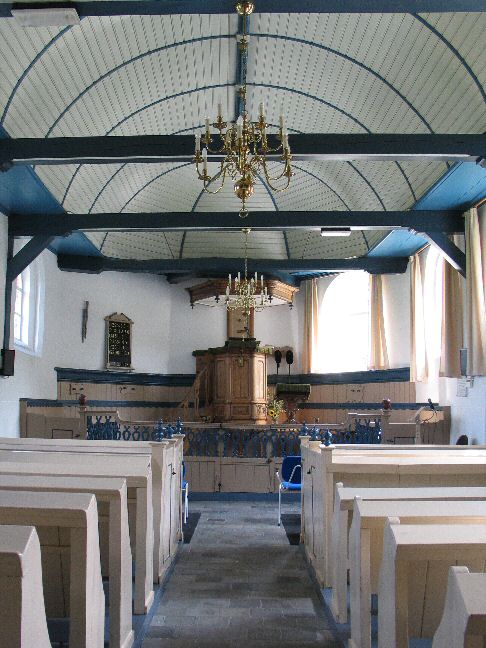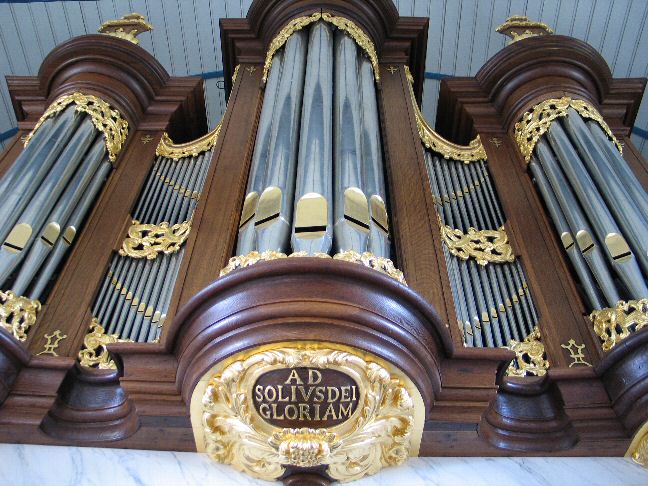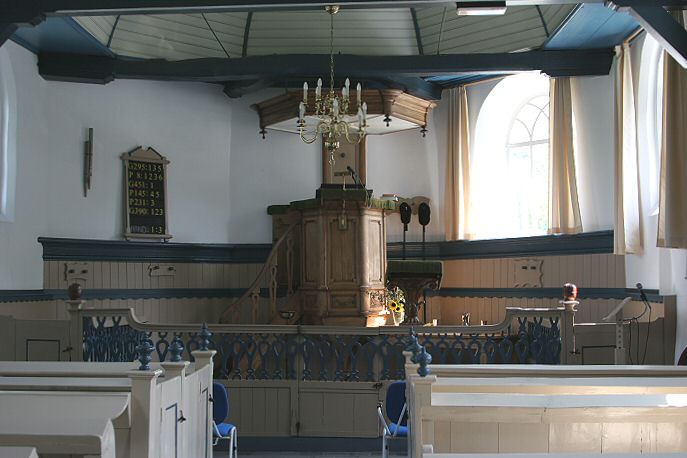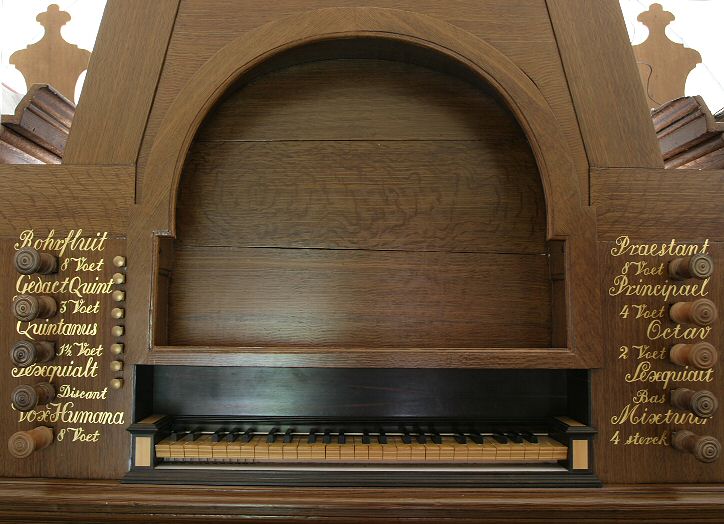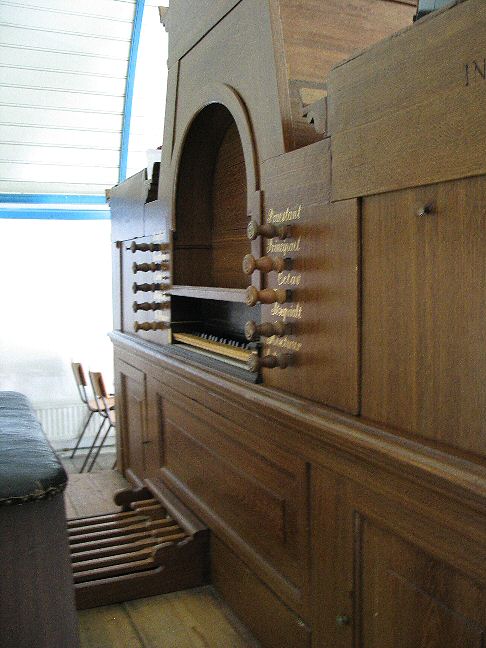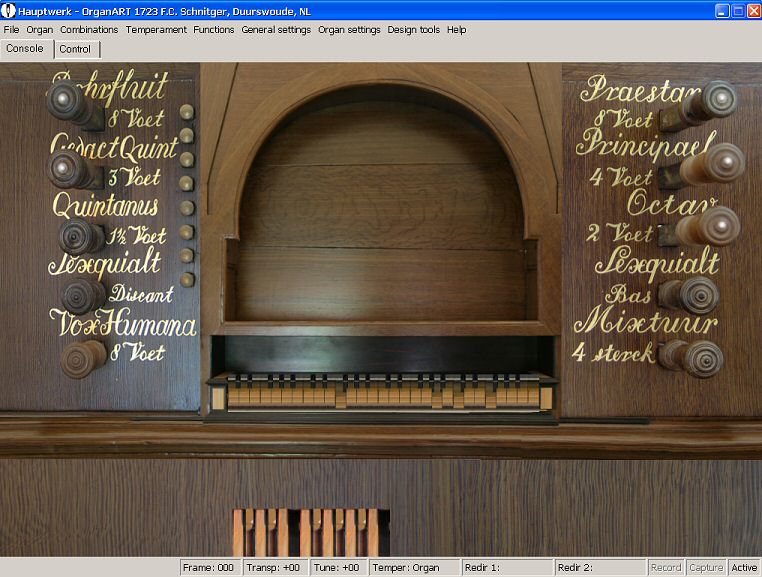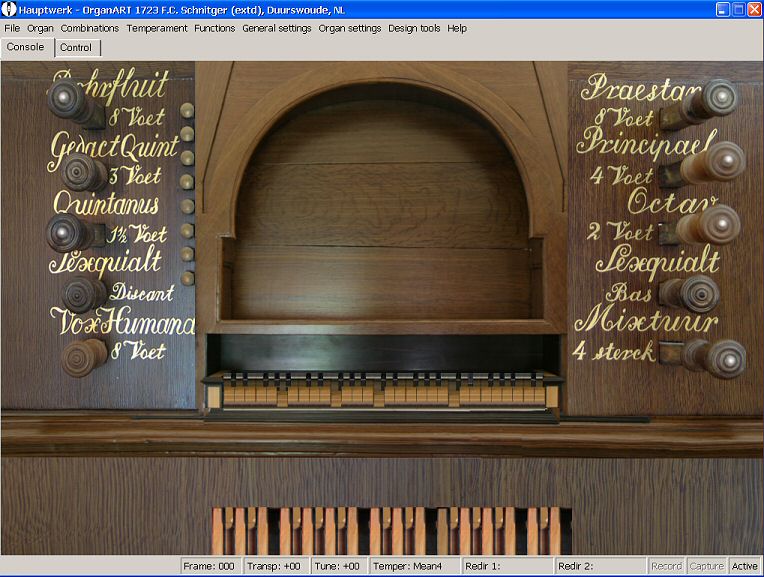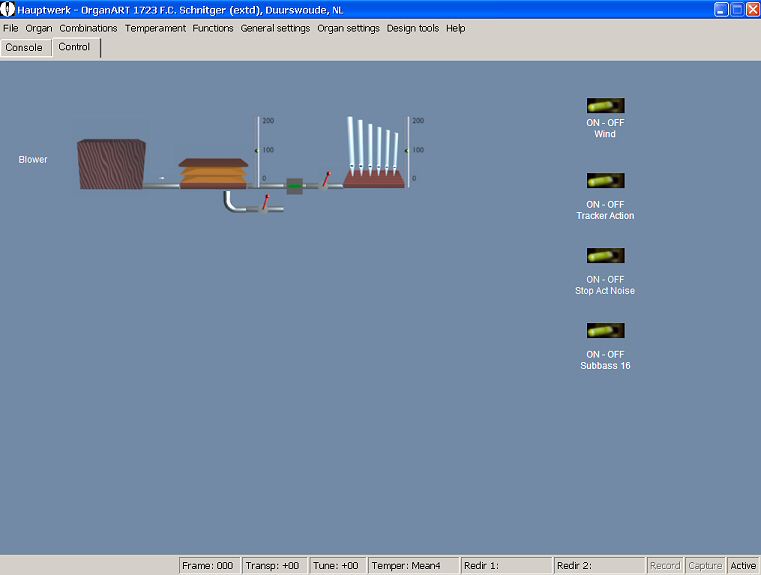1723 Frans Caspar Schnitger Organ
Hervormde Kerk, Duurswoude/Friesland, The Netherlands
Short Introduction and History
Duurswoude and Wijnjeterp together form the Frisian village called Wijnjewoude.
In 1917, organ builder Proper (from Kampen) placed an organ in the church at Duurswoude.
O.B. Wiersma had discovered that this organ was the instrument that Frans Caspar Schnitger had delivered to the Lutheran Church at Zwolle, probably in 1723; he published his discovery in 1972 in the November issue of het ORGEL. The layout of the action suggests that the instrument was originally built as the Rugpositief of another organ.
After changes by J.C. Scheuer in 1837 and 1838, J. C. van Loo rebuilt the organ in 1862.
In 2000-2001 the organ was restored by Bakker & Timmenga (Leeuwarden), Jan Jongepier was the consultant.
The instrument has largely regained its original condition.
The specification: Praestant 8, Rohrfluit 8, Principael 4, GedactQuint 3, Octav 2, Quintanus 1 1/2, Sexquialt, Mixtuur, VoxHumana; pull-down pedals.
Source: Jan Jongepier: Het ORGEL 98 (2002), nr. 5, 12-16 [summary]
The church room has a dry acoustics with about 1 seconds of reverberation.
See Location in Googlemaps
Recording technique
The organ was recorded in May 2007 with 48 kHz, 24 bit, multi-channel for Hauptwerk 2, using the multi-release technique introduced by OrganArt. The stops were recorded with multiple release levels for short and long key attacks for optimal acoustical mapping. Attack sensitive ranks were additionally recorded with multiple attacks for slow and fast key attacks (velocity sensitive set version only)
Virtual Console
Specification
Organ temperament: Mean-tone (1/6 comma)
Manual compass: C - c3 (extd. version d3)
Pedal compass: C - H (extd. version d1), pull-down pedal
Wind pressure 61 mm
Pitch a1 = 460 Hertz
Manuaal
|
Praestant 8 Pedaal: Subbas 16 |
Schnitger (C - E: Roerfluit) extd. version Praestant: C - d3
|
Requirements
Loaded Version |
Memory Requirements 3) |
Processor Speed 2) |
|
16-bit, compressed1), single loop |
630 MB |
≥ 800 MHz SingleCore |
|
16-bit, compressed, all loops |
760 MB |
≥ 800 MHz SingleCore |
|
24-bit, compressed, all loops |
1320 MB |
≥ 800 MHz SingleCore |
1) Lossless compression (no loss of sound quality!)
2) Minimal configuration: Single-Core, 2 GByte RAM
3) To load this organ into Hauptwerk you will need enough free memory in your computer, due to the amount of playable stops, not including the operating system or any other programs that may be running!
We recommend a professional audio card (e.g. RME-Series) and a studio headphone (e.g. AKG Reference Headphone K701, K712) for optimal sound and room impression.
Demos
The following demo pieces were recorded with the Hauptwerk Advanced Edition software and the virtual organ sample set with no additional effects processing.
Live recorded demos by Anton Doornhein, NL :
Jan Pieterszoon Sweelinck (* 1562 Deventer/NL; † 1621)
"Allein Gott in der Höh' sei Ehr" (Original temperament) | 4:22 min
Var 1: Rohrfluit 8', Praestant 8'
Var 2: Rohrfluit 8'
Var 3: Rohrfluit 8', Praestant 8', Principael 4'
Var 4: Rohrfluit 8', Praestant 8', Principael 4', Mixtuur 4 sterck
Joannis de Lublin (Poland * ~ 1520 ?, † ?)
Danse No. 5 | 0:52 min
Vox Humana 8', + Praestant 8'
Danse No. 14 | 1:08 min
Rohrfluit 8', Gedact Quint 3', + Quintanus 1 1/2
Danse No. 18 | 0:49 min
Rohrfluit 8', Gedact Quint 3', Sexquialt, Praestant 8', Principael 4', + Vox Humana 8'
Heinrich Scheidemann (* ~ 1596 Wöhrden/Germany, † 1663)
Praeambulum in d | 2:21 min
Rohrfluit 8' + Praestant 8'
Ped.: Subass 16' (extd.), fixed coupled
J. Pachelbel (* 1653, Nürnberg; † 1706)
"Aria quarta" (Original temperament) | 5:05 min
Aria: Rohrfluit 8'
Var 1: Rohrfluit 8', Praestant 8'
Var 2: Rohrfluit 8', Praestant 8', Principael 4'
Var 3: Rohrfluit 8', Praestant 8', Principael 4', Octav 2'
Var 4: Rohrfluit 8', Vox Humana 8
Var 5: Rohrfluit 8', Quintanus 1 1/2
Var 6: Rohrfluit 8', Praestant 8', Principael 4', Gedact Quint 3', Octav 2'
Aria: Rohrfluit 8'
D. Buxtehude (* ~ 1637 Helsingborg, DK; † 1707 Lübeck)
Passacaglia in d (Original temperament) | 6:08 min
Rohrfluit 8' + Praestant 8' + Principael 4' + (Gedact Quint 3', Octav 2') - (Gedact Quint 3', Octav 2')
- Principael 4' - Praestant 8'
Ped.: Subass 16' (extd.), fixed coupled
Canzonetta in G (Werckmeister III temperament) | 2:41 min
Rohrfluit 8' , Quintanus 1 1/2, + (Praestant 8', Principael 4')
Anonymus (based on "Première Entrée du Ballet Royal de l'Impatience" by Jean Batiste Lully)
"Cancion para la Corneta con el Eco" (Mean tone quarter comma temperament) | 4:17 min
Rohrfluit 8', Praestant 8', Sexquialt disc
J. S. Bach (1685-1750) | 9:03 min
Fantasia (Concerto) in G BWV 571 (Kirnberger temperament
Allegro: Rohrfluit 8', Principael 4', Gedact Quint 3', Quintanus 1 1/2, Octav 2'
Adagio: Praestant 8'
Allegro: Rohrfluit 8', Principael 4', Gedact Quint 3', Quintanus 1 1/2, Octav 2', Mixtuur 4 sterck
Ped.: Subass 16' (extd.), fixed coupled
Numerous other live recordings can be found on the ConcertHall Website
(Advanced Search, Organ: OAM - F.C. Schnitger, Duurswoude)
© OrganArt Media, all rights reserved
No demo sounds may be used or transmitted in any form for public purposes without the prior written permission of the publisher!


